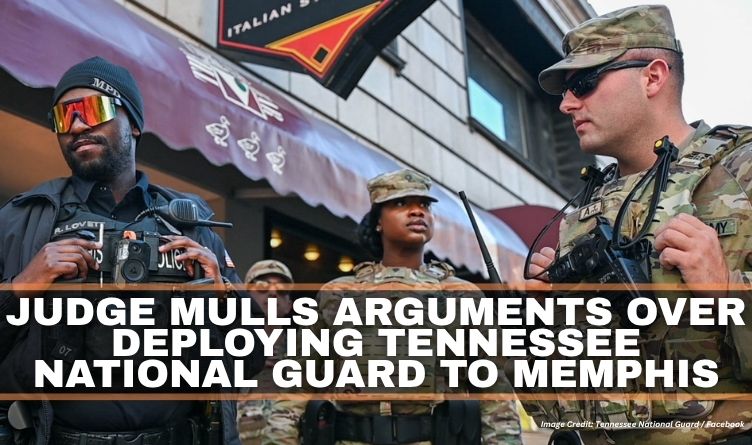State says governor has sole authority to mobilize troops; plaintiffs contend he broke the law.
Image Credit: Tennessee National Guard / Facebook
By Sam Stockard [Tennessee Lookout -CC BY-NC-ND 4.0] –
The Tennessee Attorney General’s Office argued Monday against removing the National Guard from Memphis, claiming the governor has authority to mobilize them even without action by the legislature or local government bodies.
The claims countered a challenge in Davidson County Chancery Court by Democrat state lawmakers and Memphis officials who say Gov. Bill Lee violated state law and the Constitution by mobilizing troops for police work as part of the Memphis Safe Task Force.

Davidson County Chancellor Patricia Moskal did not decide Monday whether to grant an injunction that would remove the National Guard from Memphis.
Moskal said several times in the hearing she has seen no written order from the governor to send troops to Memphis and had only heard about a press release to deploy National Guard personnel to Shelby County as part of the Memphis Safe Task Force, which was done following a memo by President Donald Trump.
Shelby County Mayor Lee Harris, three state lawmakers, a Memphis City Council member and two Shelby County commissioners sued the state after Harris declared a state of emergency in Shelby County caused, in part, by the influx of inmates into the county’s judicial system.
Joshua Salzman, attorney with the Democracy Forward Foundation, which is representing the plaintiffs, told the court, “The governor’s unilateral decision to deploy troops to militarily occupy an American city is as unlawful as it is shocking.”
The deployment is also “causing ongoing, irreparable injury to the plaintiffs and to their constituents” with Memphis’ streets being patrolled by soldiers, he said.
The Constitution allows National Guard troops to be deployed only in cases of rebellion or invasion, and those must be approved by the legislature and requested by the local governing body, he said. Salzman acknowledged Memphis has suffered from crime, but he said there was no sudden emergency that demanded the National Guard deployment, only a post by Trump on Truth Social.

Arguing the state’s case, Assistant Attorney General Cody Brandon claimed the court has no authority to stop the governor from deploying troops because he is the commander-in-chief of the state’s army and can determine when they should be used.
He also cast doubt on Harris’s claims that the Guard deployment is costing the state financially, because their mobilization is being funded by the federal government.
Brandon also said the Guard has helped the task force, a coalition of state and federal agencies led by the U.S. Marshals Service, make hundreds of arrests as a “force multiplier” to reduce violent crime, even though its main duty is patrolling streets.
The legal fight centers, in part, on whether the Tennessee National Guard is a “militia” or an “army.”
A Tennessee governor’s use of a militia is restricted under the state law and the state Constitution.
State law constrains the governor’s use of a militia for civilian enforcement and requires cities and counties to request the governor’s deployment of the Guard. Neither Memphis city officials nor Shelby County officials have requested the National Guard.
Brandon claimed that the National Guard is an “army,” not a militia, and therefore unrestrained by the restrictions set out in state law and the constitution.
Memphis is among a handful of American cities — Los Angeles, Portland and Chicago — that have seen a surge in federal law enforcement, including members of the National Guard, ostensibly to combat crime and apprehend immigrants without lawful status.
Tennessee is the only affected state with its governor welcoming the federal presence.




2 Responses
Yup, lucifer’s accursed dimmercraps, sho loves dey criminals.
“Harris declared a state of emergency in Shelby County caused, in part, by the influx of inmates into the county’s judicial system.” Well shucks, we sure wouldn’t want criminals off the streets now would we? All I can say is I doubt anyone complaining about the “clean up” lives anywhere near the problem but, I’ve seen numerous videos of residents that are praising it. Also, I don’t live there anymore and don’t go there anymore for this very reason, CRIME. No city big or small should accept city wide crime. I’m just glad that someone is doing something and it’s certainly not the so-called leaders of Memphis.